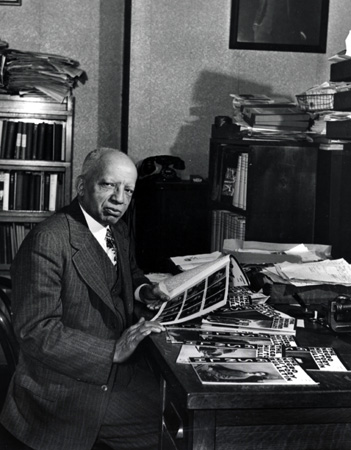Several book boxes came with a ton of brown packing paper, which I used to weave in and out of the loft bed as a background for this month's display. I wasn't sure what I was going for, other than a consistent look, but after I finished wrapping the frame, it reminded me of tobacco leaves hanging to dry. Tobacco was a labor-intensive crop prevalent on many of the east and southeastern plantations during the slave years, so the look fits Black History month in that way. I haven't said that aloud, preferring to leave the interpretation to the viewer's imagination. I used pictures from the Library of Congress and hung them directly on the brown paper. I displayed books dealing with the time around Lincoln's Emancipation Proclamation as well as key people in the early struggle for freedom and subsequent civil rights. It's sad to look back and see those parts of history where people erred in their treatment of human beings-- slavery, the holocaust, apartheid. We tell ourselves we wouldn't be a part of that, but seeing injustice and choosing to ignore it is no different than condoning it. I believe too many of us are asleep in the midst of a present day holocaust when it comes to the deaths of innocent unborn children, but that's not what this display is about so I'll share my thoughts in another post. It's encouraging, though, to see those individuals throughout history that recognized injustice and were courageous enough to do something about it. We especially celebrate them this month.
As I worked on the display, I realized I never thought about what I display each year as being a part of my history since it's Black History month. The title itself seems segregative, like it's set apart from the rest of American history. But I realized that black history is a part of our American history, so it's my history, too, and that's how I'm going to think about it from now on. I assumed it began years ago because many of the history books failed to record events and contributions involving blacks throughout our country's history, but I thought I'd better do some research on the origins of Black History month to confirm that. I learned about Carter G. Woodson, who is considered the Father of Negro History and in 1926 organized the first Negro History Week, which evolved into Black History month, although the Web site I retrieved the following photo calls it African American History month.

Carter G. Woodson (1875-1950)
Courtesy of the National Academy of Sciences Online, African American History Program
I found a quote of Woodson's that really resonated with my epiphany that Black History is a part of my history, too. On the founding of Negro History Week he said, "We should emphasize not Negro History, but the Negro in history. What we need is not a history of selected races or nations, but the history of the world void of national bias, race hate, and religious prejudice." YES, Dr. Woodson!! Otherwise, we're continuing to set ourselves apart, even with good intentions.
Oh, for the day when Americans are categorized by citizenship, character, & contributions to mankind;
when colors refer to our flag instead of a label to brandish as a crutch or bully stick;
when our history is one history, undivided , & with liberty & justice for all. --Donna Van Cleve
